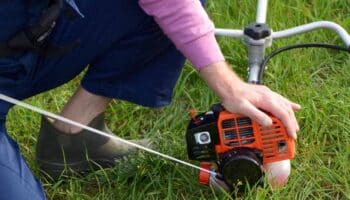We've independently reviewed this article to make sure it's as accurate as we can make it.
To find out more about our article creation and review process, check out our editorial guidelines.
Have you decided it’s time for an electric mower, but you can’t decide between corded and cordless?
You’re not alone! In fact, thousands of people are struggling with the same issue.
But, don’t worry! You’ve come to the right place. In this article, we’re going to take an in-depth look at corded vs cordless lawn mowers.
Corded mowers are more affordable, lightweight, and have a constant power supply, but a limited range. Cordless lawn mowers, on the other hand, are easier to use and have a wider range, but they cost more and have limited battery life.
Are you looking for the inside track on corded and cordless mowers? Read on for the full breakdown.
Corded vs Cordless Lawn Mowers
To make things easier for you, I’ve compiled a list of the main differences between corded and cordless mowers.
This list will help you choose the best option for your specific needs. So, let’s dive in!
#1 Range
As you may already know, a corded electric mower has a range limit. You can’t just run a massively long extension cord (or connect two or more shorter ones together) and here’s why—electrical resistance.
Electricity in your extension cord (and this is true for any electric cable) loses voltage the longer the cord. This means the 110v at your socket isn’t 110v when it gets to your mower.

Now for most lengths of extension cable (and therefore most lawns) this isn’t an issue. But once you get over 100 feet in length, the voltage drop on a normal domestic extension cord can cause your mower problems. You can overheat the motor, reduce the life of the mower, and in some cases it just won’t work.
If you’re using a domestic socket and need to use your mower over 100 feet away from it, you have three choices: get a cordless mower, get a gas-powered mower, or get an extension cord with a larger-than-normal gauge wire.
With a cordless mower, you don’t have any issues with cable length. Obviously, you don’t have any issues with a cable at all. But what you have to be aware of is the time your mower will operate on a single charge.
They rate most cordless mowers to last between 1 and 1.5 hours on a single charge. So how do you work out how much lawn you can cover? Time for some (very simplified) math.
First, take the cutting diameter of your mower. For our example, we’ll use 19 inches, as this is a common blade diameter. This means our mower will cut a 19-inch strip. Now, take away a couple of inches because there is always overlap when you’re mowing (you never cut perfect 19-inch strips side by side on your lawn).
Next, we need to estimate the speed we mow and for the sake of our example, we’ll make it easy and say a foot per second. So, with a 17-inch cutting width, we are cutting roughly 1.4 square feet per second. This means that we would cut around 5,000 sqft in an hour or 7500 sqft in 1.5 hours.
Obviously, there are several other factors to consider to get a more exact figure, but as a quick rule of thumb, you won’t be a million miles away. So, now you can work out if your mower will cut your lawn in one go.
Make sure to consider the factors mentioned above when choosing your electric lawn mower.
#2 Weight
A corded mower will weigh less than a cordless one. Part of a cordless mower’s weight is the battery, so if you don’t need a battery, it will weigh less.
And it follows: the bigger the battery (the longer you can run on one charge), the heavier the mower.
This can make a bit of a difference in how easy your mower is to operate around the lawn. Especially if you have a manually powered one. If your lawn is on a slope, it’s a bit harder to push uphill.
If you have a self-powered mower, this isn’t as much of an issue, but you will still need to lift and handle your mower occasionally, so the weight can still be a factor.
A self-powered cordless mower means it needs to use some of the battery to power the wheels and not just the blades. This means that your mower will either be rated for less time on a single charge or have a bigger battery. But that comes at a price increase.
#3 Ease of use
There’s no getting away from it. A cordless mower is easier to use. Without having to think about the cable, you can just keep mowing. Even with the added weight of the battery, a cordless mower is simplicity itself.
With a cable, you need to think about getting around obstacles, not getting tangled up, and you must avoid running it over.
All this usually means you will flip the cord around regularly as you mow.
#4 Maintenance
Electric mowers are very maintenance-friendly. Aside from keeping them clean, you won’t have much to worry about.

The only difference here is in the charging of the battery. For the cordless mower, you must remember to keep your battery charged.
You can get pretty frustrated when you set out to mow the lawn and realize you forgot to charge the battery from the last time.
#5 Battery Life & Charge Time
While we’re on the subject of batteries, it’s worth noting a couple of things. The first is that charging time can vary considerably between cordless mowers and will range from 30 minutes to two hours and above depending on the machine.
The next thing is, batteries deteriorate with charging cycles. After a few years, you’ll find that you’re not mowing as much before the battery needs charging.
One way to deal with both these problems, and we recommend it, is to buy a second battery.
A second battery will make sure you don’t get almost finished and have to wait two hours to do the last little section. It will also help with the other charging issues.
If you want to get any replacement part – or see how much one would cost – click to enter your model number in the search bar below. Our partners at AppliancePartsPros stock almost every part with free guides on how to install them.

#6 Price
There’s a big difference in purchase price between corded and cordless mowers. Modern batteries are high-tech, but that comes with a cost.
A significant part of a cordless mower’s price is in the battery. And this is why a cordless mower can easily be twice the price of its equivalent corded version.
Conclusion
We’ve covered the advantages and disadvantages of corded and cordless mowers. We’ve looked at the major features of both and highlighted what you need to look out for. Now you should be ready to make your decision.
So, if you have a reasonably sized lawn, easy access to electricity sockets, and want a lightweight cheaper machine, a corded option might be best. As long as you don’t mind that little extra awkwardness that comes with the cable, a corded mower will happily keep your lawn tidy for years. At a low price point.
If you want the freedom of not worrying about cables, or you need to mow over 100 feet from an electricity socket, then a cordless option is the right choice. But you will have to pay a premium for that freedom.
That’s it, it’s time to head to your sales point and take a look at the different models. But no matter whether corded or cordless, an electric mower is a good choice. Good luck with your mowing, and here’s to a soon-to-be tidy lawn!







